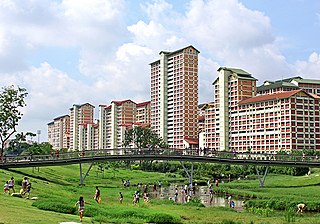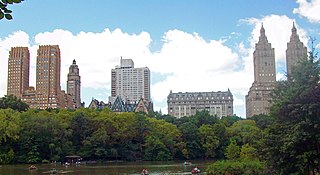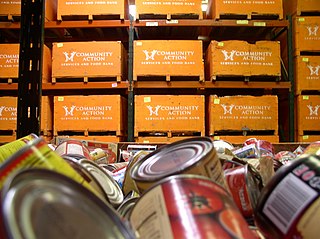
Medicaid in the United States is a federal and state program that helps with medical costs for some people with limited income and resources. Medicaid also offers benefits not normally covered by Medicare, including nursing home care and personal care services. The Health Insurance Association of America describes Medicaid as "a government insurance program for persons of all ages whose income and resources are insufficient to pay for health care."

Weatherization or weatherproofing is the practice of protecting a building and its interior from the elements, particularly from sunlight, precipitation, and wind, and of modifying a building to reduce energy consumption and optimize energy efficiency.

Public housing is a form of housing tenure in which the property is usually owned by a government authority, either central or local.
A tax credit is a tax incentive which allows certain taxpayers to subtract the amount of the credit they have accrued from the total they owe the state. It may also be a credit granted in recognition of taxes already paid or a form of state support.

Habitat for Humanity International (HFHI), generally referred to as Habitat for Humanity or Habitat, is an international, non-governmental, and nonprofit organization, which was founded in 1976 by couple Millard and Linda Fuller. Habitat for Humanity is a Christian organization. The international operational headquarters are located in Americus, Georgia, United States, with the administrative headquarters located in Atlanta. As of 2020, Habitat for Humanity operates in all 50 U.S. states and more than 70 countries.
The Low-Income Housing Tax Credit is a dollar-for-dollar tax credit in the United States for affordable housing investments. It was created under the Tax Reform Act of 1986 (TRA86) and gives incentives for the utilization of private equity in the development of affordable housing aimed at low-income Americans. LIHTC accounts for the majority of all affordable rental housing created in the United States today. As the maximum rent that can be charged is based upon the Area Median Income ("AMI"), LIHTC housing remains unaffordable to many low-income renters. The credits are also commonly called Section 42 credits in reference to the applicable section of the Internal Revenue Code. The tax credits are more attractive than tax deductions as the credits provide a dollar-for-dollar reduction in a taxpayer's federal income tax, whereas a tax deduction only provides a reduction in taxable income. The "passive loss rules" and similar tax changes made by TRA86 greatly reduced the value of tax credits and deductions to individual taxpayers. Less than 10% of current credit expenditures are claimed by individual investors.

A housing cooperative or a housing co-op, is a legal entity, usually a cooperative or a corporation, which owns real estate, consisting of one or more residential buildings; it is one type of housing tenure. Housing cooperatives are a distinctive form of home ownership that has many characteristics that differ from other residential arrangements such as single family home ownership, condominiums and renting.
New Community Corporation (NCC) is a not-for-profit community development corporation based in Newark, New Jersey. NCC focuses on community organizing, provision of a variety of community-enhancing services, and resident participation in agency operation. Early prototypes of the community action movement included local housing and service agencies started by the Ford Foundation Gray Areas Initiative and the United States Office of Economic Opportunity, and both federal and private Mobilization for Youth in New York City.

Affordable housing is housing which is deemed affordable to those with a median household income or below as rated by the national government or a local government by a recognized housing affordability index. Most of the literature on affordable housing refers to mortgages and number of forms that exist along a continuum – from emergency shelters, to transitional housing, to non-market rental, to formal and informal rental, indigenous housing, and ending with affordable home ownership.
The Low Income Home Energy Assistance Program (LIHEAP) is a United States federal social services program first established in 1981 and funded annually through Congressional appropriations. The mission of LIHEAP is to assist low income households, particularly those with the lowest incomes that pay a high proportion of household income for home energy, primarily in meeting their immediate home energy needs. The program, part of the United States Department of Health and Human Services (HHS), is funded by grants appropriated from the federal government.

Meadowlands Drive is a suburban road in Ottawa, Ontario, Canada. It begins at Prince of Wales Drive as a continuation of Hog's Back Road in the neighborhood of Rideauview. There are two small shopping plazas and a Shell station at its corner with Prince of Wales. It then continues westward towards Fisher Avenue and consists of low-income housing projects, low-rise apartment buildings, townhouses and semi-detached homes. The speed limit here is 50 km/h (31 mph). most of Meadowlands is one lane, other than between Prince of Wales to Fisher, and from Chesterton to Merivale.
The HOME Investment Partnerships Program (HOME) is a type of United States federal assistance provided by the U.S. Department of Housing and Urban Development (HUD) to States in order to provide decent and affordable housing, particularly housing for low- and very low-income Americans. It is the largest Federal block grant to States and local governments designed exclusively to create affordable housing for low-income families, providing approximately US$2 billion each year.
An individual development account (IDA) is an asset building tool designed to enable low-income families to save towards a targeted amount usually used for building assets in the form of home ownership, post-secondary education and small business ownership. In principle IDAs work as matched savings accounts that supplement the savings of low-income households with matching funds drawn from a variety of private and public sources.

Subsidized housing in the United States is administered by federal, state and local agencies to provide subsidized rental assistance for low-income households. Public housing is priced much below the market rate, allowing people to live in more convenient locations rather than move away from the city in search of lower rents. In most federally-funded rental assistance programs, the tenants' monthly rent is set at 30% of their household income. Now increasingly provided in a variety of settings and formats, originally public housing in the U.S. consisted primarily of one or more concentrated blocks of low-rise and/or high-rise apartment buildings. These complexes are operated by state and local housing authorities which are authorized and funded by the United States Department of Housing and Urban Development (HUD). More than 1.2 million households currently live in public housing of some type.

Community Action Services and Food Bank (CASFB), located in Provo, Utah, is a non-profit organization that serves the low-income population of Utah, Summit, and Wasatch counties and focuses on the operation of programs that help alleviate poverty. It was founded in 1967 following the signing of the Economic Opportunity Act in 1964 by President Lyndon B. Johnson and is one of more than 1,000 independent Community Action Agencies across the country. It is sponsored by United Way of Utah County.
Section 523 loans are a mutual self-help rural housing program in the United States authorized under Section 523 of the Housing Act of 1949 and administered by the Rural Housing Service (RHS). Nonprofit organizations may obtain 2-year loans to purchase and develop land that is to be subdivided into building sites for housing. The interest rate is 3% for these loans. Applicants must demonstrate a need for the proposed building sites in the locality. Sponsors also may obtain technical assistance (TA) grants to pay for all or part of the cost of developing, administering, and coordinating programs of technical and supervisory assistance to the families who are building their own homes. Each family is expected to contribute at least 700 hours of labor in building homes for each other. Applicants must demonstrate that:
The Pennsylvania Department of Aging is a cabinet-level agency charged with providing aid to Pennsylvania's approximately 3 million individuals age 60 and older. Although the bureau operates some services directly, such as the Pharmaceutical Contact for the Elderly (PACE) prescription drug program, it generally serves as a clearinghouse of funding and information for county-level Area Agencies on Aging. The department was formed under the governorship of Milton Shapp.
Squatting in the United States describes the legal and practical aspects of squatting in the United States of America.
Non-profit housing developers build affordable housing for individuals under-served by the private market. The non-profit housing sector is composed of community development corporations (CDC) and national and regional non-profit housing organizations whose mission is to provide for the needy, the elderly, working households, and others that the private housing market does not adequately serve. Of the total 4.6 million units in the social housing sector, non-profit developers have produced approximately 1.547 million units, or roughly one-third of the total stock. Since non-profit developers seldom have the financial resources or access to capital that for-profit entities do, they often use multiple layers of financing, usually from a variety of sources for both development and operation of these affordable housing units.

Affordable housing is housing which is deemed affordable to those with a median household income as rated by the national government or a local government by a recognized housing affordability index. The challenges of promoting affordable housing varies by location.










